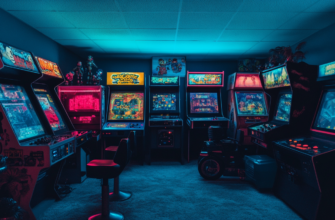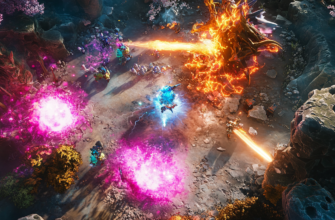- Why inventory management is essential in games
- What even is game inventory?
- Key terms to know about inventory
- Why is inventory needed in games?
- Step-by-step: How to properly manage your in-game inventory
- Step 1: Set clear sorting preferences
- Step 2: Prioritize essential items
- Step 3: Regularly clean up your inventory
- Step 4: Divide your inventory for different situations
- Step 5: Use quick-access slots wisely
- Practical tips to keep your inventory organized
- Conclusion: Master your items to master the game
Why inventory management is essential in games
Hey there, fellow gamer! Ever found yourself frantically clicking through dozens of items in your game, trying to locate the right potion or weapon? We’ve all been there. But here’s the thing: mastering your inventory is key to better gameplay and surviving those tough, high-stakes moments. Inventory systems are more than just a pack-rat’s dream; they are an integral part of almost every game.
Whether you’re slaying dragons in an RPG or taking down enemies in a fast-paced FPS, managing your game inventory can mean the difference between victory and defeat. So, if you’ve ever asked yourself, “What exactly is inventory in games, and why does it even matter?” you’re in the right place. Let’s break it down together, bro!
What even is game inventory?
In its simplest form, an inventory in games is just a collection of all the items your character or party possesses. This could be weapons, armor, potions, tools, ammo, spells, crafting ingredients—you name it. Anything your character can acquire and use in-game will generally end up in your inventory.
Key terms to know about inventory
- Inventory slots: Think of inventory slots as the boxes in a grid where items are stored. Some games offer unlimited slots, while others restrict players by weight or capacity.
- Loadout: A “loadout” usually refers to the specific set of weapons, armor, or equipment that your character has equipped at any given time.
- Carrying weight: Some games use a weight system, meaning each item has a weight, and your character can become overencumbered if you carry too much.
Now that we have the basics out of the way, let me help you understand why this is so important.
Why is inventory needed in games?
Good question! If you’ve ever played a survival game, immersive RPG, or even a battle royale, keeping track of your gear, consumables, and crafting materials is pretty much mandatory. But aside from holding your loot, why do games even have inventory systems?
- Strategic depth: Resource management is often a key factor in success. Knowing when to use certain items, and ensuring you have the right tools at the right time, adds an extra layer of strategy. For example, in games like The Witcher 3, managing potions and consumables in your inventory can give you that vital edge during boss battles.
- Enhancing immersion: A more realistic inventory system can help deepen immersion. Imagine exploring a post-apocalyptic wasteland in a game like Fallout 4 and having to carefully ration food or ammo. This level of realism amps up the experience and forces you to think about every single decision in more meaningful ways.
- Encouraging exploration: Inventories filled with useful (or sometimes random) objects encourage players to explore beyond the main quests. Finding rare loot or crafting resources in unexpected places always feels rewarding.
- Crafting and quest items: Ever tried completing a quest where you had to collect rare items or ingredients? Yeah, your inventory is where those items live until you can hand them over to the NPC. A lot of open-world games rely heavily on collecting resources, and keeping them organized in your inventory makes life easier.
The main takeaway? Whether it’s story-driven or purely functional, understanding your game’s inventory system can make the difference between a quick sprint through levels and a constant run back to town to stash your stuff.
Step-by-step: How to properly manage your in-game inventory
Now that you understand what an inventory is and why it’s essential, let’s dive into the good stuff: how to up your inventory management game. Here’s a fool-proof step-by-step guide on getting the most out of your items:
Step 1: Set clear sorting preferences
Before you even dive into the action, take a moment to see if your game has different categories of items (weapons, potions, armor, etc.). Many games nowadays let you auto-sort your inventory for easy access. If your inventory is a mess, you’ll find yourself wasting valuable time looking for that health potion when you’re in the middle of a chaotic boss battle. Trust me, you don’t want this to happen!
Step 2: Prioritize essential items
Let’s be real: not everything in your inventory is useful. Focus on stocking items that are genuinely helpful. For example, in an RPG, you want to prioritize healing potions, weapons with secondary effects (like burning or freezing), and useful accessories. Prioritize keeping tools that have multiple uses for different scenarios.
Step 3: Regularly clean up your inventory
This is a classic mistake: hoarding everything! Try your best to clean out junk after each level or game session. Keeping unnecessary items in inventory leads to headaches. Many players are reluctant to sell or throw away gear they don’t need, but at some point, clutter will impact your performance. Sell or dismantle lower-level gear that you’re not using!
Step 4: Divide your inventory for different situations
If the game allows multiple loadouts, take full advantage of this feature. For example, in a looter-shooter like Destiny 2, you might have different gear sets for PVE encounters versus PVP matches. Having presets saves time in critical moments and keeps your main inventory slot cleaner.
Step 5: Use quick-access slots wisely
Games like The Legend of Zelda: Breath of the Wild or Resident Evil let you assign specific items to quick-access slots, allowing you to pull them up without fully opening the inventory menu in-game. Keep healing items and essential weapons in these slots for faster access.
Practical tips to keep your inventory organized
Okay, let me hit you up with some extra tips I’ve learned over time that will pay off when it comes to managing your inventory:
- Color coding and variety sorting: Some games color-code items by rarity (like in Borderlands or Diablo), so make sure to automatically prioritize rarer gear. Don’t hoard hundreds of commons—you’ll just clutter valuable space.
- Know when to discard or sell: Many RPGs offer vendors who buy items you’re no longer using. Pay attention to vendor prices and exchange suitable items for in-game currency. In some games, you can even dismantle low-level gear for crafting materials.
- Identify quest-related items early: If you’re playing an open-world RPG, you’ll likely collect quest items. A neat trick is to store these separately or at least sell off items **not** categorized as quest-essential after confirming. This will keep precious inventory slots free for more important things.
Conclusion: Master your items to master the game
There you go, bro. Inventory management might not sound like the most exciting part of a game, but trust me—it’s crazy important! Understanding what you need, how to organize it, and when to use it is a key factor in taking your gameplay to the next level. Whether it’s shaving off seconds in high-intensity FPS firefights or hoarding the right gear as you grind through RPG quests, mastering your inventory will give you that edge you’re looking for.
Now that you’ve got the core strategies down, try implementing them into your favorite games. I promise you’ll notice the difference. Got some inventory management tips of your own? Drop them in the comments, or let’s chat about it over on your favorite gaming platform! Peace out, and I’ll see you in-game, inventory fully stacked and ready for action.

















